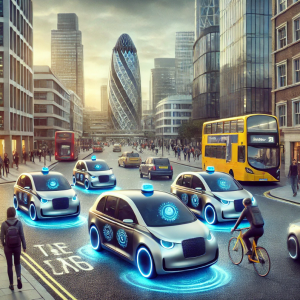
The concept of autonomous taxis has been a hot topic in the transportation industry for years. With rapid advancements in artificial intelligence (AI) and machine learning, self-driving cabs are no longer a futuristic dream but an impending reality. In the UK, several companies and government initiatives are working towards bringing autonomous taxis to the roads. But when can we expect to see them in action? Let’s explore the current developments, challenges, and potential launch timeline for autonomous taxis in the UK.
What Are Autonomous Taxis?
Autonomous taxis, also known as self-driving cabs, are vehicles equipped with AI-driven technology that allows them to operate without human intervention. These taxis rely on a combination of sensors, cameras, radar, and advanced software to navigate roads, recognize traffic signals, and ensure passenger safety.
The Evolution of Self-Driving Technology
Early Developments in Autonomous Vehicles
The journey of autonomous vehicles began decades ago with experimental self-driving cars developed by research institutions and automobile companies. Early prototypes relied on basic sensor-based navigation, but they were far from ready for public roads.
Breakthroughs in AI and Machine Learning
Recent advancements in AI and machine learning have significantly improved autonomous driving technology. AI-driven neural networks can now analyze vast amounts of real-time data, making split-second driving decisions comparable to human judgment.
The Current State of Self-Driving Cabs in the UK
Government Policies and Regulations
The UK government has been actively supporting the development of autonomous vehicles. The Automated and Electric Vehicles Act 2018 laid the groundwork for self-driving car regulations. Recent updates in policies focus on ensuring safety, liability, and insurance requirements for autonomous taxis.
Testing and Trials Conducted in the UK
Several companies have begun testing self-driving cabs in various UK cities. For example, Oxford-based Oxbotica has successfully conducted trials of autonomous vehicles on public roads. Additionally, Transport for London (TfL) has been working with tech firms to assess the feasibility of self-driving taxi services.
Key Players in the Autonomous Taxi Market
Companies Leading the Innovation
Major global companies like Waymo, Tesla, and Uber are at the forefront of autonomous taxi development. These firms have invested heavily in self-driving technology and are continuously improving their AI models to achieve full autonomy.
UK-Based Startups and Investments
UK-based startups such as FiveAI and Wayve are pioneering the autonomous vehicle sector with innovative AI-driven solutions. Government funding and private investments have helped these companies accelerate their research and testing.
Technological Challenges and Safety Concerns
AI and Decision-Making in Urban Areas
One of the biggest challenges for self-driving cabs is navigating complex urban environments. AI must accurately interpret unpredictable human behaviors, such as jaywalking pedestrians or erratic cyclists.
Cybersecurity Risks and Data Privacy
Autonomous taxis rely on connected systems, making them vulnerable to cyberattacks. Ensuring robust cybersecurity measures is essential to prevent potential threats and protect passenger data.
Public Perception and Adoption of Self-Driving Cabs
Surveys and Public Opinion
Recent surveys suggest mixed opinions on autonomous taxis. While some people are excited about the convenience and efficiency, others have concerns regarding safety and trust in AI-driven vehicles.
Benefits and Concerns for Passengers
Prospective benefits include reduced travel costs, lower accident rates, and improved accessibility for people with disabilities. However, concerns regarding system failures and AI errors remain a challenge to public acceptance.
Economic and Environmental Impact
Job Market Shifts and Employment Concerns
The rise of autonomous taxis could impact traditional taxi drivers and related industries. Governments must consider workforce transitions and reskilling programs to mitigate job displacement.
Sustainability and Reduced Carbon Emissions
Self-driving taxis, particularly electric models, can contribute to reducing carbon emissions and traffic congestion, making urban transport more eco-friendly.
When Can We Expect Autonomous Taxis in the UK?
Timeline for Full Deployment
Experts predict that autonomous taxis could be commercially available in the UK by the early 2030s. However, small-scale pilot programs may begin as early as 2025 in select cities.
Factors That Could Accelerate or Delay Adoption
Key factors affecting the rollout include technological advancements, regulatory approvals, infrastructure readiness, and public trust in the technology.
FAQs
1. Are autonomous taxis legal in the UK?
Currently, self-driving taxi trials are permitted under strict regulations. Full-scale deployment requires further legislative developments.
2. Which UK cities will see autonomous taxis first?
London, Oxford, and Cambridge are likely candidates due to ongoing trials and strong tech industry presence.
3. How safe are self-driving cabs compared to human-driven taxis?
Studies suggest that autonomous vehicles have the potential to reduce accidents, but safety concerns remain a primary challenge.
4. Will self-driving taxis replace human drivers entirely?
Not immediately. Hybrid models combining AI and human drivers may coexist for several years before full automation.
5. What companies are leading the UK’s autonomous taxi industry?
UK-based companies like FiveAI and Wayve, along with global players such as Tesla and Waymo, are leading the charge.
6. How will self-driving taxis impact taxi fares?
Autonomous taxis could lower fares due to reduced operational costs, but initial deployment might come with premium pricing.
Conclusion
Autonomous taxis are on the horizon, and while full adoption may take several years, ongoing trials and technological advancements indicate a promising future. The UK is actively working to develop regulatory frameworks, improve AI technology, and address public concerns. By the 2030s, self-driving cabs could revolutionize urban transportation, making travel safer, more efficient, and environmentally friendly.





